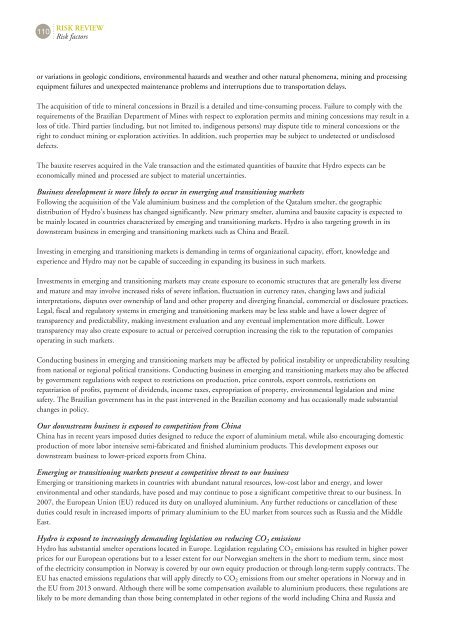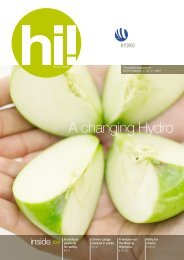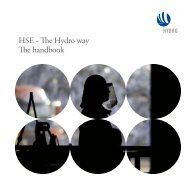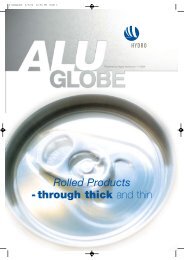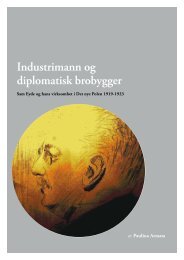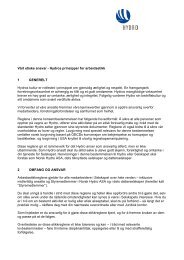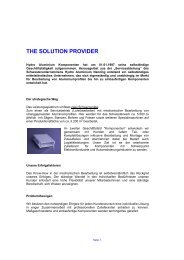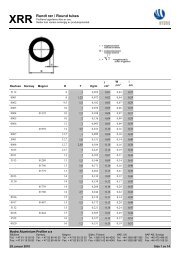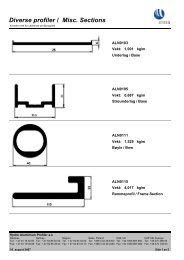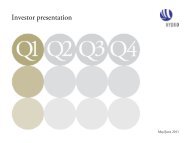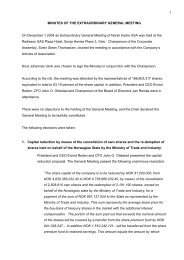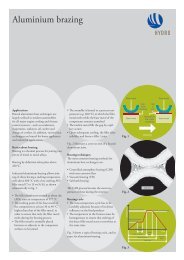Hydro Annual Report 2011b
Hydro Annual Report 2011b
Hydro Annual Report 2011b
You also want an ePaper? Increase the reach of your titles
YUMPU automatically turns print PDFs into web optimized ePapers that Google loves.
110<br />
RISK REVIEW<br />
Risk factors<br />
or variations in geologic conditions, environmental hazards and weather and other natural phenomena, mining and processing<br />
equipment failures and unexpected maintenance problems and interruptions due to transportation delays.<br />
The acquisition of title to mineral concessions in Brazil is a detailed and time-consuming process. Failure to comply with the<br />
requirements of the Brazilian Department of Mines with respect to exploration permits and mining concessions may result in a<br />
loss of title. Third parties (including, but not limited to, indigenous persons) may dispute title to mineral concessions or the<br />
right to conduct mining or exploration activities. In addition, such properties may be subject to undetected or undisclosed<br />
defects.<br />
The bauxite reserves acquired in the Vale transaction and the estimated quantities of bauxite that <strong>Hydro</strong> expects can be<br />
economically mined and processed are subject to material uncertainties.<br />
Business development is more likely to occur in emerging and transitioning markets<br />
Following the acquisition of the Vale aluminium business and the completion of the Qatalum smelter, the geographic<br />
distribution of <strong>Hydro</strong>'s business has changed significantly. New primary smelter, alumina and bauxite capacity is expected to<br />
be mainly located in countries characterized by emerging and transitioning markets. <strong>Hydro</strong> is also targeting growth in its<br />
downstream business in emerging and transitioning markets such as China and Brazil.<br />
Investing in emerging and transitioning markets is demanding in terms of organizational capacity, effort, knowledge and<br />
experience and <strong>Hydro</strong> may not be capable of succeeding in expanding its business in such markets.<br />
Investments in emerging and transitioning markets may create exposure to economic structures that are generally less diverse<br />
and mature and may involve increased risks of severe inflation, fluctuation in currency rates, changing laws and judicial<br />
interpretations, disputes over ownership of land and other property and diverging financial, commercial or disclosure practices.<br />
Legal, fiscal and regulatory systems in emerging and transitioning markets may be less stable and have a lower degree of<br />
transparency and predictability, making investment evaluation and any eventual implementation more difficult. Lower<br />
transparency may also create exposure to actual or perceived corruption increasing the risk to the reputation of companies<br />
operating in such markets.<br />
Conducting business in emerging and transitioning markets may be affected by political instability or unpredictability resulting<br />
from national or regional political transitions. Conducting business in emerging and transitioning markets may also be affected<br />
by government regulations with respect to restrictions on production, price controls, export controls, restrictions on<br />
repatriation of profits, payment of dividends, income taxes, expropriation of property, environmental legislation and mine<br />
safety. The Brazilian government has in the past intervened in the Brazilian economy and has occasionally made substantial<br />
changes in policy.<br />
Our downstream business is exposed to competition from China<br />
China has in recent years imposed duties designed to reduce the export of aluminium metal, while also encouraging domestic<br />
production of more labor intensive semi-fabricated and finished aluminium products. This development exposes our<br />
downstream business to lower-priced exports from China.<br />
Emerging or transitioning markets present a competitive threat to our business<br />
Emerging or transitioning markets in countries with abundant natural resources, low-cost labor and energy, and lower<br />
environmental and other standards, have posed and may continue to pose a significant competitive threat to our business. In<br />
2007, the European Union (EU) reduced its duty on unalloyed aluminium. Any further reductions or cancellation of these<br />
duties could result in increased imports of primary aluminium to the EU market from sources such as Russia and the Middle<br />
East.<br />
<strong>Hydro</strong> is exposed to increasingly demanding legislation on reducing CO 2 emissions<br />
<strong>Hydro</strong> has substantial smelter operations located in Europe. Legislation regulating CO 2 emissions has resulted in higher power<br />
prices for our European operations but to a lesser extent for our Norwegian smelters in the short to medium term, since most<br />
of the electricity consumption in Norway is covered by our own equity production or through long-term supply contracts. The<br />
EU has enacted emissions regulations that will apply directly to CO 2 emissions from our smelter operations in Norway and in<br />
the EU from 2013 onward. Although there will be some compensation available to aluminium producers, these regulations are<br />
likely to be more demanding than those being contemplated in other regions of the world including China and Russia and


